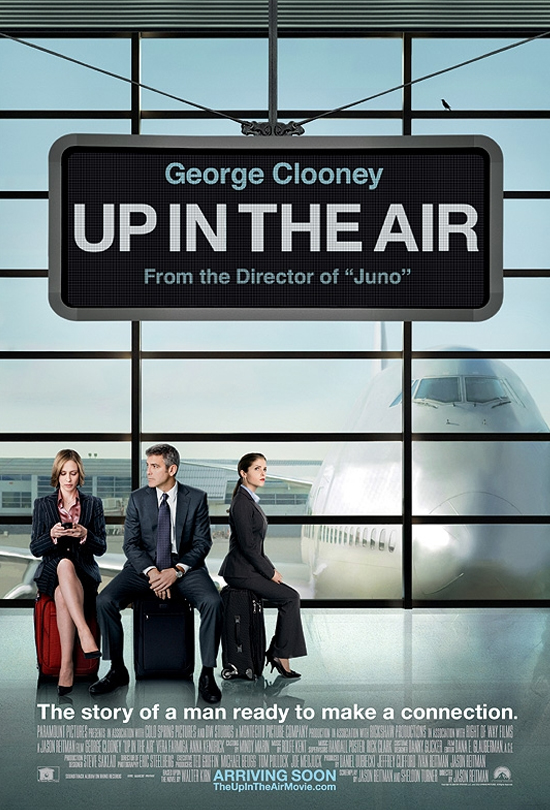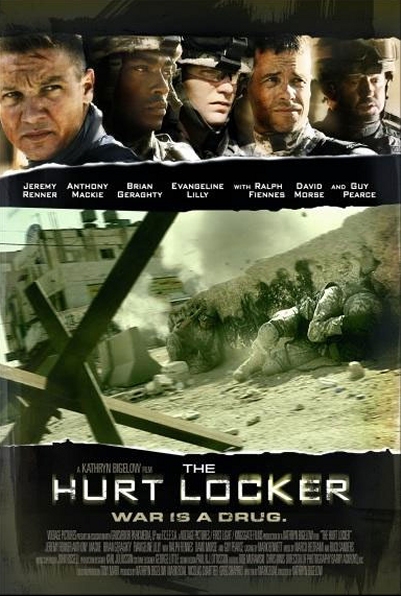Golden Globe Nominations
Posted on December 15, 2009 at 11:18 am
The 67th Annual Golden Globe Awards NOMINATIONS
HOLLYWOOD FOREIGN PRESS ASSOCIATION
2010 GOLDEN GLOBE AWARDS
FOR THE YEAR ENDED DECEMBER 31, 2009
NOMINATIONS PRESS RELEASE
1. BEST MOTION PICTURE – DRAMA
a. AVATAR
Lightstorm Entertainment; Twentieth Century Fox
b. THE HURT LOCKER
Voltage Pictures C/O 42West; Summit Entertainment
c. INGLOURIOUS BASTERDS
The Weinstein Company; The Weinstein Company
d. PRECIOUS: BASED ON THE NOVEL PUSH BY SAPPHIRE
A Lee Daniels Entertainment / Smokewood Entertainment Group Production;
Lionsgate
e. UP IN THE AIR
Paramount Pictures; Paramount Pictures
2. BEST PERFORMANCE BY AN ACTRESS IN A MOTION PICTURE – DRAMA
a. EMILY BLUNT THE YOUNG VICTORIA
b. SANDRA BULLOCK THE BLIND SIDE
c. HELEN MIRREN THE LAST STATION
d. CAREY MULLIGAN AN EDUCATION
e. GABOUREY SIDIBE PRECIOUS: BASED ON THE NOVEL
PUSH BY SAPPHIRE
3. BEST PERFORMANCE BY AN ACTOR IN A MOTION PICTURE – DRAMA
a. JEFF BRIDGES CRAZY HEART
b. GEORGE CLOONEY UP IN THE AIR
c. COLIN FIRTH A SINGLE MAN
d. MORGAN FREEMAN INVICTUS
e. TOBEY MAGUIRE BROTHERS
4. BEST MOTION PICTURE – COMEDY OR MUSICAL
a. (500) DAYS OF SUMMER
Watermark Pictures; Fox Searchlight Pictures
b. THE HANGOVER
Warner Bros. Pictures; Warner Bros. Pictures
c. IT’S COMPLICATED
Relativity Media, Scott Rudin Productions; Universal Pictures
d. JULIE & JULIA
Columbia Pictures; Sony Pictures Releasing
e. NINE
The Weinstein Company; The Weinstein Company
5. BEST PERFORMANCE BY AN ACTRESS IN A MOTION PICTURE – COMEDY OR
MUSICAL
a. SANDRA BULLOCK THE PROPOSAL
b. MARION COTILLARD NINE
c. JULIA ROBERTS DUPLICITY
d. MERYL STREEP IT’S COMPLICATED
e. MERYL STREEP JULIE & JULIA
6. BEST PERFORMANCE BY AN ACTOR IN A MOTION PICTURE – COMEDY
OR MUSICAL
a. MATT DAMON THE INFORMANT!
b. DANIEL DAY-LEWIS NINE
c. ROBERT DOWNEY JR. SHERLOCK HOLMES
d. JOSEPH GORDON-LEVITT (500) DAYS OF SUMMER
e. MICHAEL STUHLBARG A SERIOUS MAN
7. BEST ANIMATED FEATURE FILM
a. CLOUDY WITH A CHANCE OF MEATBALLS
Columbia Pictures and Sony Pictures Animation; Sony Pictures Releasing
b. CORALINE
Laika, Inc.; Focus Features
c. FANTASTIC MR. FOX
American Empirical Picture; Twentieth Century Fox
d. THE PRINCESS AND THE FROG
Walt Disney Pictures/Walt Disney Animation Studios; Walt Disney Studios
Motion Pictures
e. UP
Walt Disney Pictures/PIXAR Animation Studios; Walt Disney Studios Motion
Pictures
8. BEST FOREIGN LANGUAGE FILM
a. BAARIA (ITALY)
Medusa Film; Summit Entertainment
b. BROKEN EMBRACES (SPAIN)
El Deseo SA; Sony Pictures Classics
c. THE MAID (CHILE)
(LA NANA)
Forastero; Elephant Eye Films
d. A PROPHET (FRANCE)
Chic Films; Sony Pictures Classics
e. THE WHITE RIBBON (GERMANY)
(DAS WEISSE BAND – EINE DEUTSCHE KINDERGESCHICHTE)
Wega Films; Sony Pictures Classics
9. BEST PERFORMANCE BY AN ACTRESS IN A SUPPORTING ROLE IN A
MOTION PICTURE
a. PENÉLOPE CRUZ NINE
b. VERA FARMIGA UP IN THE AIR
c. ANNA KENDRICK UP IN THE AIR
d. MO’NIQUE PRECIOUS: BASED ON THE NOVEL
PUSH BY SAPPHIRE
e. JULIANNE MOORE A SINGLE MAN
10. BEST PERFORMANCE BY AN ACTOR IN A SUPPORTING ROLE IN A
MOTION PICTURE
a. MATT DAMON INVICTUS
b. WOODY HARRELSON THE MESSENGER
c. CHRISTOPHER PLUMMER THE LAST STATION
d. STANLEY TUCCI THE LOVELY BONES
e. CHRISTOPH WALTZ INGLOURIOUS BASTERDS
11. BEST DIRECTOR – MOTION PICTURE
a. KATHRYN BIGELOW THE HURT LOCKER
b. JAMES CAMERON AVATAR
c. CLINT EASTWOOD INVICTUS
d. JASON REITMAN UP IN THE AIR
e. QUENTIN TARANTINO INGLOURIOUS BASTERDS
12. BEST SCREENPLAY – MOTION PICTURE
a. NEILL BLOMKAMP, DISTRICT 9
TERRI TATCHELL
b. MARK BOAL THE HURT LOCKER
c. NANCY MEYERS IT’S COMPLICATED
d. JASON REITMAN, UP IN THE AIR
SHELDON TURNER
e. QUENTIN TARANTINO INGLOURIOUS BASTERDS
13. BEST ORIGINAL SCORE – MOTION PICTURE
a. MICHAEL GIACCHINO UP
b. MARVIN HAMLISCH THE INFORMANT!
c. JAMES HORNER AVATAR
d. ABEL KORZENIOWSKI A SINGLE MAN
e. KAREN O,
CARTER BURWELL WHERE THE WILD THINGS ARE
14. BEST ORIGINAL SONG – MOTION PICTURE
a. “CINEMA ITALIANO” — NINE
Music & Lyrics by: Maury Yeston
b. “I WANT TO COME HOME” — EVERYBODY’S FINE
Music & Lyrics by: Paul McCartney
c. “I WILL SEE YOU” — AVATAR
Music by: James Horner, Simon Franglen
Lyrics by: James Horner, Simon Franglen, Kuk Harrell
d. “THE WEARY KIND (THEME FROM CRAZY HEART)” — CRAZY
HEART
Music & Lyrics by: Ryan Bingham, T Bone Burnett
e. “WINTER” — BROTHERS
Music by: U2
Lyrics by: Bono
15. BEST TELEVISION SERIES – DRAMA
a. BIG LOVE (HBO)
Anima Sola and Playtone in association with HBO Entertainment
b. DEXTER (SHOWTIME)
Showtime Presents, John Goldwyn Productions, The Colleton Company, Clyde
Phillips Productions
c. HOUSE (FOX)
Universal Media Studios in association with Heel and Toe Films, Shore Z
Productions and Bad Hat Harry
d. MAD MEN (AMC)
AMC
e. TRUE BLOOD (HBO)
Your Face Goes Here Entertainment in association with HBO Entertainment
16. BEST PERFORMANCE BY AN ACTRESS IN A TELEVISION SERIES –
DRAMA
a. GLENN CLOSE DAMAGES
b. JANUARY JONES MAD MEN
c. JULIANNA MARGULIES THE GOOD WIFE
d. ANNA PAQUIN TRUE BLOOD
e. KYRA SEDGWICK THE CLOSER
17. BEST PERFORMANCE BY AN ACTOR IN A TELEVISION SERIES – DRAMA
a. SIMON BAKER THE MENTALIST
b. MICHAEL C. HALL DEXTER
c. JON HAMM MAD MEN
d. HUGH LAURIE HOUSE
e. BILL PAXTON BIG LOVE
18. BEST TELEVISION SERIES – COMEDY OR MUSICAL
a. 30 ROCK (NBC)
Universal Media Studios in association with Broadway Video and Little
Stranger Inc.
b. ENTOURAGE (HBO)
Leverage and Closest to the Hole Productions in association with HBO
Entertainment
c. GLEE (FOX)
Twentieth Century Fox Television
d. MODERN FAMILY (ABC)
Twentieth Century Fox Television
e. THE OFFICE (NBC)
Universal Media Studios, Deedle Dee Productions, Reveille LLC
19. BEST PERFORMANCE BY AN ACTRESS IN A TELEVISION SERIES –
COMEDY OR MUSICAL
a. TONI COLLETTE UNITED STATES OF TARA
b. COURTENEY COX COUGAR TOWN
c. EDIE FALCO NURSE JACKIE
d. TINA FEY 30 ROCK
e. LEA MICHELE GLEE
20. BEST PERFORMANCE BY AN ACTOR IN A TELEVISION SERIES –
COMEDY OR MUSICAL
a. ALEC BALDWIN 30 ROCK
b. STEVE CARELL THE OFFICE
c. DAVID DUCHOVNY CALIFORNICATION
d. THOMAS JANE HUNG
e. MATTHEW MORRISON GLEE
21. BEST MINI-SERIES OR MOTION PICTURE MADE FOR TELEVISION
a. GEORGIA O’KEEFFE (LIFETIME TELEVISION)
Sony Pictures Television
b. GREY GARDENS (HBO)
Specialty Films and Locomotive in association with HBO Films
c. INTO THE STORM (HBO)
Scott Free and Rainmark Films Production in association with the BBC and HBO
Films
d. LITTLE DORRIT (PBS)
Masterpiece/BBC Co-production
e. TAKING CHANCE (HBO)
Motion Picture Corporation of America and Civil Dawn Pictures in association
with HBO Films
22. BEST PERFORMANCE BY AN ACTRESS IN A MINI-SERIES OR MOTION
PICTURE MADE FOR TELEVISION
a. JOAN ALLEN GEORGIA O’KEEFFE
b. DREW BARRYMORE GREY GARDENS
c. JESSICA LANGE GREY GARDENS
d. ANNA PAQUIN THE COURAGEOUS HEART OF IRENA
SENDLER
e. SIGOURNEY WEAVER PRAYERS FOR BOBBY
23. BEST PERFORMANCE BY AN ACTOR IN A MINI-SERIES OR MOTION
PICTURE MADE FOR TELEVISION
a. KEVIN BACON TAKING CHANCE
b. KENNETH BRANAGH WALLANDER: ONE STEP BEHIND
c. CHIWETEL EJIOFOR ENDGAME
d. BRENDAN GLEESON INTO THE STORM
e. JEREMY IRONS GEORGIA O’KEEFFE
24. BEST PERFORMANCE BY AN ACTRESS IN A SUPPORTING ROLE IN A
SERIES, MINI-SERIES OR MOTION PICTURE MADE FOR TELEVISION
a. JANE ADAMS HUNG
b. ROSE BYRNE DAMAGES
c. JANE LYNCH GLEE
d. JANET McTEER INTO THE STORM
e. CHLOË SEVIGNY BIG LOVE
25. BEST PERFORMANCE BY AN ACTOR IN A SUPPORTING ROLE IN A SERIES,
MINI-SERIES OR MOTION PICTURE MADE FOR TELEVISION
a. MICHAEL EMERSON LOST
b. NEIL PATRICK HARRIS HOW I MET YOUR MOTHER
c. WILLIAM HURT DAMAGES
d. JOHN LITHGOW DEXTER
e. JEREMY PIVEN ENTOURAGE



